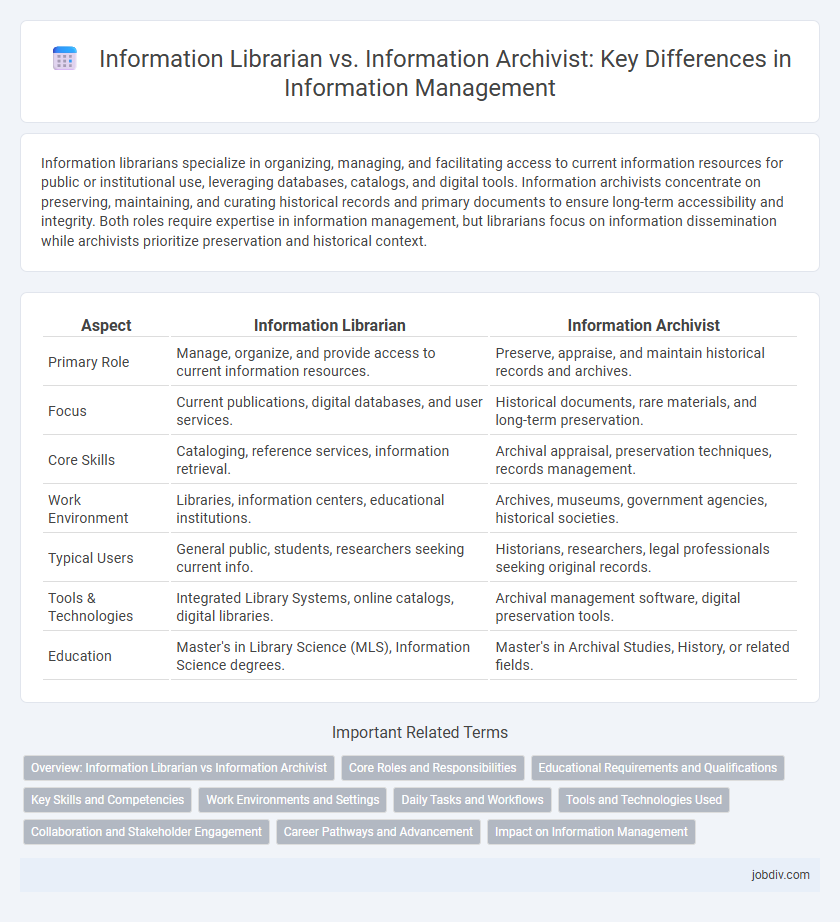Information librarians specialize in organizing, managing, and facilitating access to current information resources for public or institutional use, leveraging databases, catalogs, and digital tools. Information archivists concentrate on preserving, maintaining, and curating historical records and primary documents to ensure long-term accessibility and integrity. Both roles require expertise in information management, but librarians focus on information dissemination while archivists prioritize preservation and historical context.
Table of Comparison
| Aspect | Information Librarian | Information Archivist |
|---|---|---|
| Primary Role | Manage, organize, and provide access to current information resources. | Preserve, appraise, and maintain historical records and archives. |
| Focus | Current publications, digital databases, and user services. | Historical documents, rare materials, and long-term preservation. |
| Core Skills | Cataloging, reference services, information retrieval. | Archival appraisal, preservation techniques, records management. |
| Work Environment | Libraries, information centers, educational institutions. | Archives, museums, government agencies, historical societies. |
| Typical Users | General public, students, researchers seeking current info. | Historians, researchers, legal professionals seeking original records. |
| Tools & Technologies | Integrated Library Systems, online catalogs, digital libraries. | Archival management software, digital preservation tools. |
| Education | Master's in Library Science (MLS), Information Science degrees. | Master's in Archival Studies, History, or related fields. |
Overview: Information Librarian vs Information Archivist
Information librarians specialize in managing, organizing, and facilitating access to current information resources, including books, databases, and digital media, primarily serving educational and public inquiries. Information archivists focus on preserving, cataloging, and maintaining historical records and primary source materials to ensure long-term accessibility and authenticity. Both roles require expertise in information management but differ in scope, with librarians emphasizing user services and archivists prioritizing preservation and provenance.
Core Roles and Responsibilities
Information librarians specialize in organizing, managing, and providing access to current information resources, focusing on cataloging, reference services, and user education. Information archivists concentrate on preserving, appraising, and maintaining historical records and documents for long-term accessibility and legal compliance. Both roles involve information management but differ in temporal focus, with librarians supporting active information retrieval and archivists ensuring enduring preservation.
Educational Requirements and Qualifications
Information librarians typically require a master's degree in library and information science (MLIS) accredited by the American Library Association (ALA), along with strong organizational and research skills. Information archivists often hold degrees in history, archival science, or library science, with specialized training in archival theory, preservation, and records management. Both roles demand proficiency in digital technologies and information management systems, but archivists usually need additional certifications such as Certified Archivist (CA) to validate expertise in archival standards.
Key Skills and Competencies
Information librarians excel in research proficiency, data organization, and user-focused information retrieval, ensuring efficient access to current and relevant resources. Information archivists specialize in preservation techniques, metadata standards, and historical record management, emphasizing the long-term maintenance and authenticity of archival materials. Both roles demand strong technological skills, attention to detail, and expertise in digital information systems, but their focus diverges between facilitating immediate information access and safeguarding historical documents.
Work Environments and Settings
Information librarians typically work in public libraries, academic institutions, and corporate information centers, focusing on organizing, managing, and facilitating user access to information resources. Information archivists are often employed in museums, government agencies, and historical societies, specializing in preserving, cataloging, and maintaining historical records and archival materials. Both professionals play essential roles in information management but operate in distinct environments tailored to their expertise in either current information retrieval or long-term preservation.
Daily Tasks and Workflows
Information librarians manage daily tasks such as cataloging, organizing, and assisting patrons in locating resources across physical and digital collections, emphasizing user accessibility and information retrieval. Information archivists focus on appraisal, preservation, and maintenance of historical records and digital assets, ensuring long-term integrity and compliance with archival standards. Both roles require proficiency in metadata standards and database management but differ in prioritizing immediate user needs versus long-term preservation.
Tools and Technologies Used
Information librarians primarily use integrated library systems (ILS), digital cataloging tools like MARC and Dublin Core, and search platforms such as online public access catalogs (OPAC). Information archivists employ specialized archival software including Archon, ArchivesSpace, and digital preservation tools like LOCKSS and PREMIS for managing, preserving, and providing long-term access to digital records. Both professionals utilize metadata standards but apply them differently according to their distinct roles in information organization and preservation.
Collaboration and Stakeholder Engagement
Information librarians and information archivists collaborate by sharing expertise in data organization and preservation to enhance access and usability of digital and physical resources. Librarians engage with academic, public, and corporate stakeholders to tailor information services, while archivists work closely with historians, legal professionals, and cultural institutions to maintain contextual integrity and provenance. Effective stakeholder engagement relies on joint strategic planning, integrating user feedback, and employing specialized metadata standards to bridge information retrieval and long-term preservation goals.
Career Pathways and Advancement
Information librarians typically advance through roles in public, academic, or special libraries, gaining expertise in cataloging, user services, and digital resource management, while pursuing certifications like the Master's in Library Science (MLS). Information archivists often progress by specializing in records management, preservation, and digital archiving within museums, government agencies, or corporate settings, with credentials such as the Certified Archivist (CA) designation enhancing career opportunities. Both careers offer pathways into leadership positions, including library directors or senior archivists, emphasizing the importance of continuing education and adaptability to emerging information technologies.
Impact on Information Management
Information librarians enhance information management by curating, organizing, and providing access to knowledge resources tailored to user needs, leveraging digital databases and cataloging systems. Information archivists impact management through the preservation, appraisal, and long-term stewardship of historical and record materials, ensuring authenticity and context for future reference. Both roles contribute uniquely by balancing accessibility with preservation, optimizing information lifecycle management in organizations.
Information Librarian vs Information Archivist Infographic

 jobdiv.com
jobdiv.com